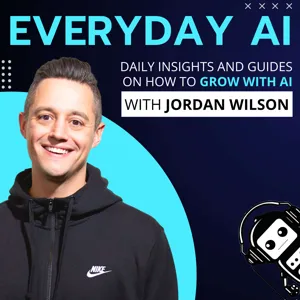Why do drugs fail at such a high rate? What can AI do about? We're asking an expert helping to lead the Pharma industry. Chris Gibson, Co-Founder and CEO at Recursion, joins us to discuss how GenAI is reshaping the Pharma industry and medical drugs.
Newsletter: Sign up for our free daily newsletter
More on this Episode: Episode Page
Join the discussion: Ask Chris and Jordan questions about AI and Pharma
Upcoming Episodes: Check out the upcoming Everyday AI Livestream lineup
Website: YourEverydayAI.com
Email The Show: info@youreverydayai.com
Connect with Jordan on LinkedIn
Timestamps:
[00:01:15] Daily AI news
[00:04:00] About Chris and Recursion
[00:06:30] Impact of AI and reducing drug failure
[00:12:15] Work being done in drug testing and AI
[00:16:45] LLMs being used in Pharma
[00:19:10] Challenges with data
[00:23:20] Future of medicine with AI
[00:26:20] Chris' final takeaway
Topics Covered in This Episode:
1. Why drugs fail at a high rate
2. Work being done in drug testing
3. AI's impact on drug research
4. How AI and drug testing work
5. Future of medicine with AI
Keywords:
AI, artificial intelligence, drug failure rates, Amazon, reInvent 2023 conference, Titan AI image generator, DeepMind, chemical materials, computer chips, solar panel, ChatGPT, Sam Altman, OpenAI, Microsoft, pharmaceutical industry, clinical trials, FDA approval process, data problem, technology tools, large language models, molecules, Trillions of relationships, public data set, Amazon Prime, healthcare, preventative medicine, AGI, mission-driven AI, Recursion, everyday AI show.


![Alex Telford - Unlocking Innovation in Pharma - [Invest Like the Best, EP.360]](https://www.podcastworld.io/podcast-images/invest-like-the-best-with-patrick-o-shaughnessy-3pmywn1q.webp)



